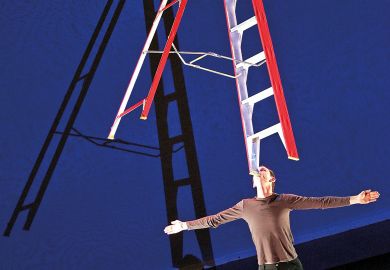A London university’s decision to deduct the full wages of academics participating in last year’s marking boycott is to be tested at an employment tribunal, after union members scored an initial victory.
Scholars say they lost tens of thousands of pounds when Queen Mary University of London opted to withhold the full salaries of University and College Union members taking part in the action between April and September 2023.
The academics say that assessment constituted only a small part of their role, and argue that the work was delayed rather than cancelled, as it was completed when the boycott ended.
But Queen Mary has insisted that the boycott had put students’ ability to progress with their studies in “direct jeopardy” and had resulted in a small number of students facing delays to their graduations.
The case, which could set an important precedent for determining how institutions respond to industrial action, is set to proceed to a full tribunal after one of the claimants, UCU branch chair Zara Dinnen, persuaded a judge that she had brought her claim within stated time limits.
The claimants have argued that the deductions amounted to a failure to give trade union officials paid time off for carrying out trade union duties. They also argue that in the process of making deductions for action short of a strike, the university compiled a “blacklist” against employees. They claim that the university went further than necessary in gathering information for the purpose of making pay deductions, including by apparently selecting some boycotters over others in an “arbitrary and discriminatory manner”.
Dr Dinnen, a senior lecturer in contemporary literature, said that she was “pleased” with the outcome, “the next step in our fight to end this practice, and secure reparations for workers”.
“These deductions are a harm committed by university management against workers in UK universities,” she told Times Higher Education.
Ruth Fletcher, reader in medical law at Queen Mary and a UCU branch member, said that it had “fallen to ordinary trade union members to challenge the legality of these impoverishing deductions” and that the claim had “jumped the first hurdle”.
“[The case is] significant because university employers have been trying to make 100 per cent pay deductions – for withdrawal of a few hours’ work – lawful in practice,” she said. “If they succeed, they will not only be punishing individual workers for standing up to poor employer practice, but they will also hollow out rights to assemble and organise for better pay and working conditions.”
A hearing scheduled for 10 October was due to consider whether Dr Dinnen’s case can move forward alongside a similar suit lodged by James Eastwood, the union branch’s former co-chair, and when the full tribunal should be heard.
A university spokesperson said: “It is our moral and regulatory responsibility to protect our students’ education during any industrial action. No pay was withheld unless staff deliberately tried to put our students’ futures at risk by delaying their progression.”
Register to continue
Why register?
- Registration is free and only takes a moment
- Once registered, you can read 3 articles a month
- Sign up for our newsletter
Subscribe
Or subscribe for unlimited access to:
- Unlimited access to news, views, insights & reviews
- Digital editions
- Digital access to THE’s university and college rankings analysis
Already registered or a current subscriber? Login








